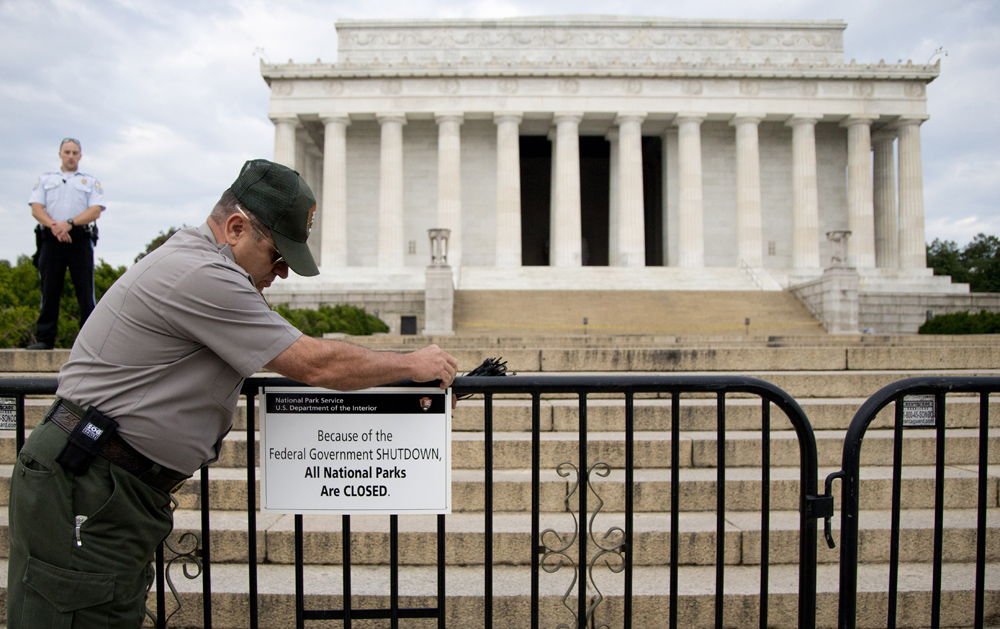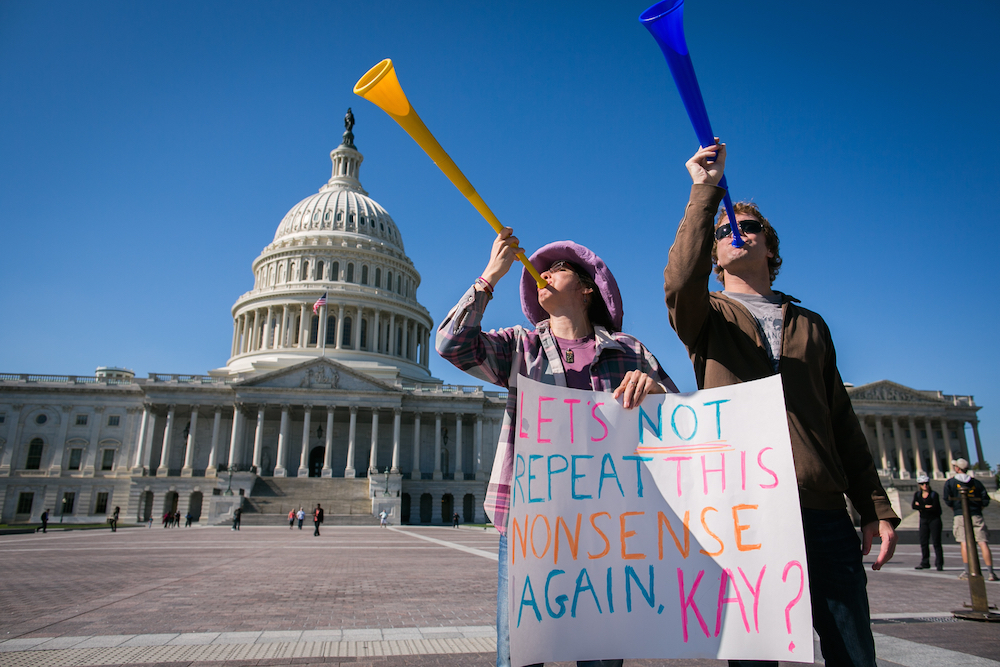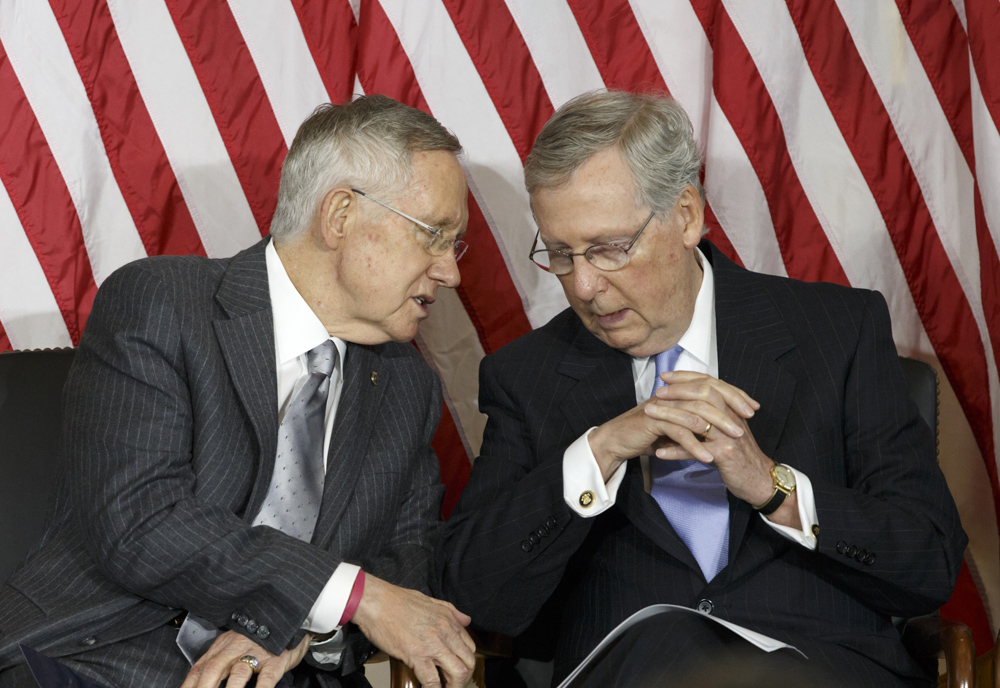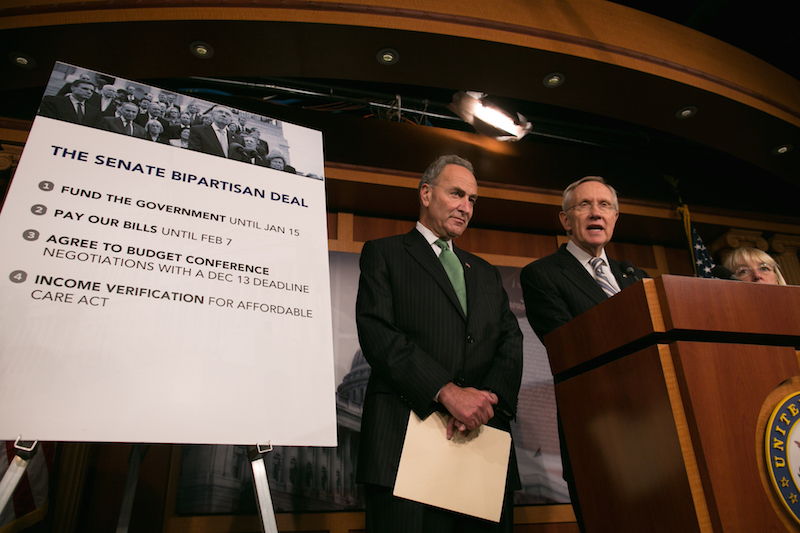Republicans and Democrats are girding for another huge fiscal fight this fall, and both parties hope they can use it to make gains in their war of attrition over how Washington spends money.
For a year and a half, Congress has worked through divisions on Washington’s fiscal policy with relatively little acrimony after their dramatic brinkmanship and a two-week government shutdown in 2013.
But things are getting testy again. Conservative budget hawks, frustrated by the lack of significant progress on fiscal discipline in Washington, appear to be gunning for another showdown, fueled by an unpredictable Republican presidential primary in which Donald Trump has roared to the front of the pack.
Any negotiating with Democrats is likely to rankle conservatives in Congress who are pressing to defund Planned Parenthood and are threatening to shut down Washington over the issue. Social conservatives are furious over a series of videos showing group members selling tissue from aborted fetuses for research.
Republican leaders in the House and Senate have launched investigations into Planned Parenthood’s activities, but are trying to avoid a major spending battle over the issue, at least this fall.
They also are trying to tamp down the anti-establishment mood in the party by arguing that Republicans are winning the budget battles slowly but surely.
But who is really winning the war? It depends what the meaning of “winning” is.
If winning means cutting the overall budget but finding ways to save defense spending, it’s the GOP. Republicans also seem to be winning when it comes to elections, as Republicans built on their sizable margins in the House and took over control of the Senate, despite or perhaps because of their tough stance on spending.
But Democrats can claim another kind of victory, one in the court of public opinion. And if both sides come together in the coming weeks to hash out a budget deal that raises non-defense spending, progressives will be able place that in the win column as well.

Protestors holds signs against the government shutdown on Capitol Hill. (AP Photos)
Why now?
Congress this fall will have to figure out a spending agreement for 2016, plus a solution to the debt ceiling, which Congress has limited to about $18.1 trillion. That ceiling will be hit by October or November.
Raising the debt ceiling has produced some of the fiercest battles of President Obama’s tenure, most significantly in 2011, when federal debt was downgraded for the first time in the nation’s history after budget talks failed. That fight led to the Budget Control Act of 2011, which mandated 10 years of cuts in discretionary spending that took effect in 2012.
The parties softened the cuts in 2014 and 2015, but there are some lawmakers who want deep cuts again once the temporary deal expires Oct 1. Time is running out, and House Speaker John Boehner says Congress is likely to pass stop-gap funding in September.
Democrats say they are willing to lift the caps on defense spending if Republicans agree to increase domestic spending to pre-sequestration levels. But a long messy process lies ahead.
“I can imagine a contingent of Republicans that wants to defund Planned Parenthood, and there’s going to be a group wanting to defund the Affordable Care Act and the Department of Homeland Security [over immigration],” said Drew Hammill, spokesman for House Minority Leader Nancy Pelosi.
“They’re all non-starters,” he added. “The [Democratic] leaders made it very clear before they left for the August district work period there is no Democratic support for defunding Planned Parenthood. It’s not something that the president is going to sign. It can’t advance in the Senate. It’s a waste of time. We’re constantly lurching from one crisis to another and this fall will be no different.”
If Republicans insist on finding offsets to sequester relief, Democrats say they will sign off on such a plan only if it includes closing tax loopholes or increasing user fees to add revenue.

A U.S. Park Police officer watches at left as a National Park Service employee posts a sign on a barricade closing access to the Lincoln Memorial in Washington, October 2013.
Working toward a deal
Richard Manning, president of Americans for Limited Government, says the country is in a fiscal death spiral, and notes that slow economic growth under President Obama is making it worse. He says the only real card Republicans hold is a willingness to say “we’re not funding the government if we don’t get some changes that we need.”
Manning’s group is tightly aligned with the conservative Freedom Caucus in the House, which regularly bucks its leadership.
He and other conservative groups, such as Heritage Action, express disgust with GOP leaders’ willingness to strike another deal with congressional Democrats and Obama to work around sequester caps this fall.
In late August, Senate Majority Leader Mitch McConnell, R-Ky., downplayed talk of a government shutdown and said Republicans have little choice but to negotiate and focus on next year’s election. “We just don’t have the votes to get the outcome that we’d like,” he said.
But with Republicans intent on increasing defense spending, Democrats are hoping to notch some wins for themselves on key domestic programs. For months, they have urged GOP leaders to begin negotiations, but say Boehner and McConnell have yet to engage, sidetracked by other major battles, such as the Iran deal. They also appear to be worried about a conservative rebellion.
“Republicans should join us at the negotiating table so we can work out funding levels for the national government and avoid a government shutdown,” Rep. Chris van Hollen, D-Md., the ranking member of the Budget Committee, told the Washington Examiner. “What I fear are the threats coming from people like [Sen.] Ted Cruz, once again threatening to shut down the government.”
But with so many legislative deadlines this fall and a restive conservative faction, any serious negotiations to replace the sequester may get punted time and again in stop-gap spending bills, possibly lasting into next year.
“We’re setting up for surrender,” Rep. Dan Mulvaney, R-S.C., said Sept. 9 at a gathering of House conservatives, referring to the budget process and defunding Planned Parenthood. “Leadership is going to have to choose: Do they want it to be a talking point, or do they want to actually do something about it?
“Until Mitch wakes up and realizes that he’s no different than Harry Reid right now, it’s going to be a real rugged couple of months,” Mulvaney said.

House Speaker John Boehner of Ohio kisses House Minority Leader Nancy Pelosi in the Rose Garden of the White House.
Moral victory for Republicans
Regardless of how this latest battle turns out, experts and lawmakers have diverging views on who’s coming out on top in the long run.
Boehner’s office reminds fellow Republicans that since 2011, under his tenure, the GOP has forced Obama and Democrats to accept $2.1 trillion in spending reductions over 10 years. These are the most significant spending reductions in modern history, the office says, more significant than under President Reagan and Speaker Tip O’Neill or President Clinton and Speaker Newt Gingrich.
“After opposing any cuts at all, Speaker Boehner and Republicans succeeded in forcing President Obama and his party to accept real, significant spending cuts,” Boehner spokesman Cory Fritz told the Washington Examiner.
To truly fix the country’s debt problem, though, GOP leaders and their supporters say it will take electing a Republican president willing to tackle Social Security and Medicare reform.
“With respect to the overall budget wars, we’ve been winning, we’ve actually held down spending quite a bit. Since it peaked at 9.1 percent of [gross domestic product] in 2010, discretionary spending declined to 6.8 percent last year,” said Rep. Tom Cole, R-Okla., a member of the House Budget Committee and one of Boehner’s top allies.
“But we’re not going to win this fight unless you get the entitlement reform addressed, and that will take a Republican president, somebody who can actually work with us,” he said.
But Republican leaders’ pleas for patience amid incremental success in cutting spending is doing nothing to mollify budget hawks, who are increasingly on edge. Conservatives say Republicans were initially winning the budget battles that dominated Washington since 2011 and produced flatter spending at the beginning of Boehner’s tenure, but have since given up the fight.
“You did have some success, not really with rolling back the size of government, but at least flattening spending,” Manning said.

Lawrence, a federal worker, was furloughed during the government shutdown in October 2013. (Graeme Jennings/Washington Examiner)
Harry Stein, director of fiscal policy at the Center for American Progress, authored a paper titled “Setting the Right Course in the Next Budget Agreement,” released Sept. 8, calling on Democrats to hold the line on the GOP’s demands. Stein said Republicans appear to have won the budget wars, but only if their narrow goal was “to make large discretionary spending cuts.”
“They were successful in that goal, but the losers were the economy and perhaps national security as well,” he said.
In order to really solve the country’s debt problems and possible insolvency in Medicare and Medicaid, Stein says, more revenue is needed and Republicans need to be willing to close tax loopholes and restructure the tax code.
Republican budget hawks argue that the GOP holds the majority in both houses of Congress and shouldn’t be negotiating with Obama and Democrats, even if it means the federal government shuts down again this year.
They are unconvinced that the shutdown of 2013 caused the party any real political damage, and tell the Examiner that unless funding legislation strips money from Planned Parenthood, they’ll vote against it, even if it is just a short-term bill. Dan Holler, a spokesman for Heritage Action, says conservatives are pessimistic about the fall budget battle because GOP leaders are unwilling to fight.
“It’s not so much that the Democrats are being effective, it’s that Republicans, pretty much since August 2011, have been totally unwilling to fight on fiscal issues,” he said.
That September, Republicans started to pick a fight over offsetting disaster spending but backed off, Holler said. “Since their big [sequester] win, they’ve been totally unwilling to confront the president on issues of spending,” he said.

Public image victory for Democrats
Others say that in terms of public perception, these fights simply make the Republicans look bad.
“Republicans are always on the losing end of shutdown politics. Most voters instinctively believe shutdowns are their fault. Seems like that’s good reason enough for them to stop playing the game,” said Ron Faucheax, president of Clarus Research Group, a nonpartisan polling firm.
Numerous polls show that the public blames the GOP for government shutdowns, and would do so again this year.
A late August Quinnipiac poll found that 69 percent of respondents oppose “shutting down the government over differences about federal government funding.” It’s an indiscernible drop from two years ago, when 72 percent said they oppose a shutdown.
“The shutdowns of 1995 and 1996 created a sense among voters that the perceived anti-government party was more willing to risk shutting down government to get what they wanted than the perceived pro-government party,” Faucheax said. “That sense has lingered on and the perception that the Republicans are the anti-government party and the Democrats are the pro-government party has hardened in recent years. Polling has consistently showed that Republicans get more of the blame, regardless of the parliamentary technicalities.”
Holler and his allies brush aside such statements, arguing that Republicans made sweeping gains in the 2014 midterm elections after the 2013 shutdown.

Sen. Harry Reid addresses the press, in October 2013, after the Senate approved a bipartisan budget deal, as Sen. Chuck Schumer looks on. (Graeme Jennings/Examiner)
“Republican leadership has a flawed view of what the electorate is looking for — [voters] want a vision for the future of the country that is consistent with their own, which is more conservative — and they want their elected representatives to fight for it,” Holler said.
“There is a reason Iowa polls have Trump, Ben Carson and Carly Fiorina attracting 56 percent of the GOP primary vote. People don’t like what Washington Republicans are doing,” he said.
Cole said Republicans simply got lucky in 2014 when they made gains in the House and Senate. The Obamacare website rollout was such a debacle and voters had turned their attention to that White House failure and had forgotten the government shutdown by the time the election rolled around.
“Government shutdowns — I don’t think you win those,” Cole said. “With all due respect, Heritage Action usually wants to pursue strategies that don’t work even though I agree with their goals. They have forgotten that politics is the art of the possible, and [slashing spending levels] is a lot less possible with a Democratic president.
“This is the most conservative conference ever … I don’t see Mitch McConnell and John Boehner as the enemy,” he added. “No disrespect to Heritage Action, but we live in the real world. If you think you are going to create a bigger Republican majority and win the White House next year by shutting down the government, you’re living in a fantasy land.”
This article appears in the Sept. 14 edition of the Washington Examiner magazine.
